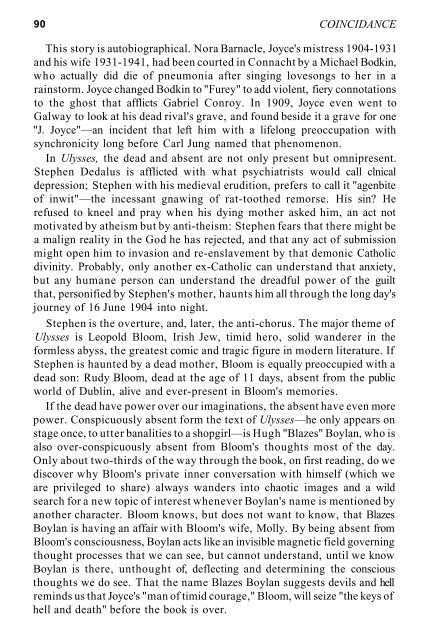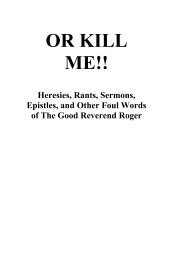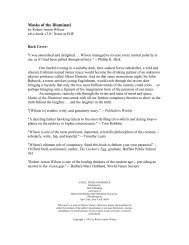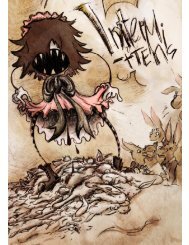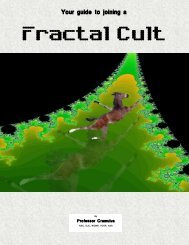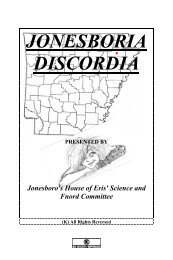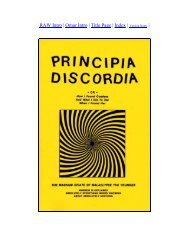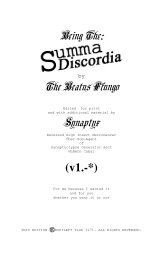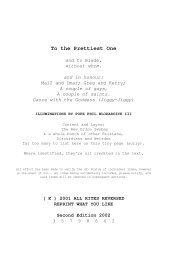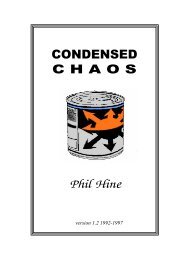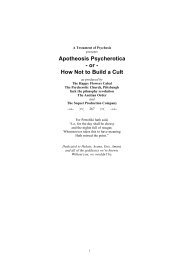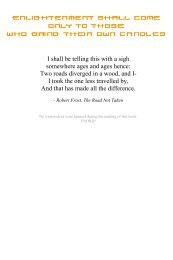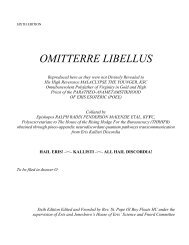Coincidance - Principia Discordia
Coincidance - Principia Discordia
Coincidance - Principia Discordia
Create successful ePaper yourself
Turn your PDF publications into a flip-book with our unique Google optimized e-Paper software.
90 COINCIDANCE<br />
This story is autobiographical. Nora Barnacle, Joyce's mistress 1904-1931<br />
and his wife 1931-1941, had been courted in Connacht by a Michael Bodkin,<br />
who actually did die of pneumonia after singing lovesongs to her in a<br />
rainstorm. Joyce changed Bodkin to "Furey" to add violent, fiery connotations<br />
to the ghost that afflicts Gabriel Conroy. In 1909, Joyce even went to<br />
Galway to look at his dead rival's grave, and found beside it a grave for one<br />
"J. Joyce"—an incident that left him with a lifelong preoccupation with<br />
synchronicity long before Carl Jung named that phenomenon.<br />
In Ulysses, the dead and absent are not only present but omnipresent.<br />
Stephen Dedalus is afflicted with what psychiatrists would call clnical<br />
depression; Stephen with his medieval erudition, prefers to call it "agenbite<br />
of inwit"—the incessant gnawing of rat-toothed remorse. His sin? He<br />
refused to kneel and pray when his dying mother asked him, an act not<br />
motivated by atheism but by anti-theism: Stephen fears that there might be<br />
a malign reality in the God he has rejected, and that any act of submission<br />
might open him to invasion and re-enslavement by that demonic Catholic<br />
divinity. Probably, only another ex-Catholic can understand that anxiety,<br />
but any humane person can understand the dreadful power of the guilt<br />
that, personified by Stephen's mother, haunts him all through the long day's<br />
journey of 16 June 1904 into night.<br />
Stephen is the overture, and, later, the anti-chorus. The major theme of<br />
Ulysses is Leopold Bloom, Irish Jew, timid hero, solid wanderer in the<br />
formless abyss, the greatest comic and tragic figure in modern literature. If<br />
Stephen is haunted by a dead mother, Bloom is equally preoccupied with a<br />
dead son: Rudy Bloom, dead at the age of 11 days, absent from the public<br />
world of Dublin, alive and ever-present in Bloom's memories.<br />
If the dead have power over our imaginations, the absent have even more<br />
power. Conspicuously absent form the text of Ulysses—he only appears on<br />
stage once, to utter banalities to a shopgirl—is Hugh "Blazes" Boylan, who is<br />
also over-conspicuously absent from Bloom's thoughts most of the day.<br />
Only about two-thirds of the way through the book, on first reading, do we<br />
discover why Bloom's private inner conversation with himself (which we<br />
are privileged to share) always wanders into chaotic images and a wild<br />
search for a new topic of interest whenever Boylan's name is mentioned by<br />
another character. Bloom knows, but does not want to know, that Blazes<br />
Boylan is having an affair with Bloom's wife, Molly. By being absent from<br />
Bloom's consciousness, Boylan acts like an invisible magnetic field governing<br />
thought processes that we can see, but cannot understand, until we know<br />
Boylan is there, unthought of, deflecting and determining the conscious<br />
thoughts we do see. That the name Blazes Boylan suggests devils and hell<br />
reminds us that Joyce's "man of timid courage," Bloom, will seize "the keys of<br />
hell and death" before the book is over.


